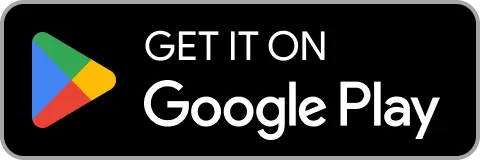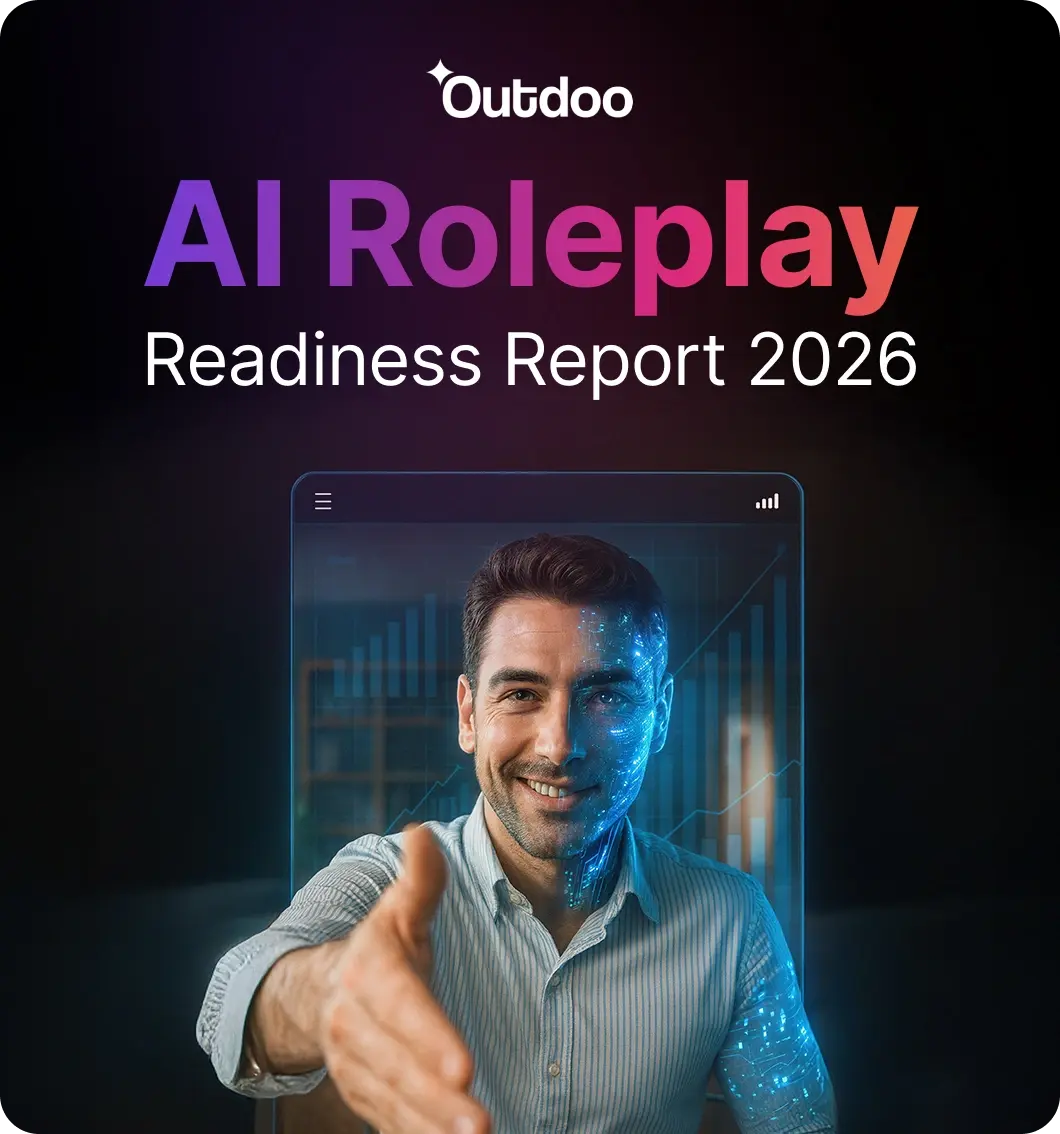Revenue leaders across the globe share a common question: “How do I boost my sales pipeline?” In 2025, personalization is key to revenue success, and AI has become a massive part of staying efficient and competitive. AI-powered sales coaching and role-play platforms are now essential tools for improving rep performance and accelerating revenue growth. Manual, gut-feel coaching methods are quickly becoming a thing of the past; today, data-driven accuracy is crucial to hitting revenue targets.
One emerging player in this space is Avarra AI, known for its innovative AI-driven sales simulations and coaching designed to mirror real buyer conversations. In this blog, we’ll take a comprehensive look at Avarra AI’s core capabilities, pricing, strengths, and gaps, and then explore several competitive alternatives (including our own platform) to help you make an informed decision.
A Quick Look at Avarra AI
- Realistic AI Avatars: Avarra creates AI avatars that mimic buyers based on your uploaded content, providing life-like practice scenarios.
- Skill Assessment: It leverages AI to assess reps' skills in objection handling, product positioning, and call methodology, using data-driven coaching interventions to close knowledge and skill gaps.
- Ideal Users: The platform suits sales teams looking to boost ramp speed, improve call effectiveness, and efficiently scale coaching across distributed or hybrid teams.
What is Avarra AI?
Avarra AI is a sales simulation platform that uses realistic AI-powered simulations and avatar-led role-plays to accelerate sales reps’ ramp-up and skill development. It enables reps to practice real-world conversations tailored to each company’s unique sales process by creating customizable scenarios from your own materials (such as call transcripts, playbooks, and sales collateral).
The AI avatars act as virtual buyers, allowing reps to engage in mock sales calls that mirror the tone and challenges of actual prospects. Between sessions, Avarra provides AI-driven coaching with targeted feedback on things like handling objections and messaging accuracy, helping reps continuously fine-tune their skills.
Managers can tap into real-time insights via dashboards and reports that track individual and team trends, making it easier to identify skill gaps and measure coaching impact at scale. In short, Avarra aims to provide consistent, scalable training across an organization through immersive simulation and data-driven feedback.
Target Industries: While Avarra’s platform is broadly applicable, it especially targets industries where complex sales cycles, deep product knowledge, and proficient objection handling are critical. According to Avarra, this includes sectors like BFSI (Banking, Financial Services, and Insurance), healthcare, manufacturing, and SaaS, businesses where reps frequently face detailed questions and high-stakes negotiations.
Key Features of Avarra AI
- AI-Powered Role-Play: Intuitive scenario simulations with AI avatars that adjust based on a rep’s responses, making practice sessions both challenging and relevant to real sales situations.

- Real-Time Feedback: The AI provides detailed coaching tips and instant feedback on things like speech patterns, objection handling success, and messaging accuracy. This helps reps refine their technique on the fly.
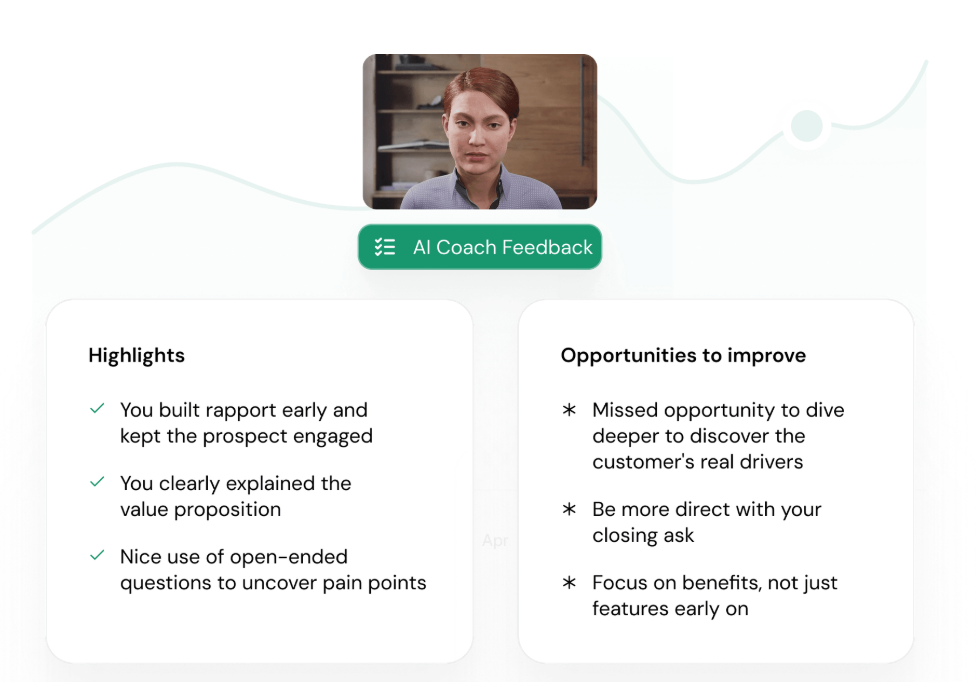
- Insightful Analytics: Unified analytics dashboards track performance, allowing managers to spot common rep skill gaps and see coaching impact over time. You get data-driven insight into how practice is translating into real-world performance.

- Scalable Training: Training and coaching are largely AI-automated. Teams can onboard and upskill larger groups of reps with consistent quality, which is especially useful for distributed teams or rapid growth phases.
Avarra AI Pricing (2025)
Avarra AI’s pricing isn’t publicly listed. Like many B2B SaaS products, the cost likely depends on your organization’s specific needs and scale. Factors that influence pricing include:
- Number of users: The number of sales reps being trained.
- Customization requirements: The degree to which the AI avatars need to be customized.
- Support and integration: The level of customer support and integration with existing sales technology.
In practice, this means Avarra probably offers custom pricing tiers or plans tailored to individual business needs. Interested businesses will need to contact Avarra directly for a quote.
Now that we’ve covered what Avarra AI offers, let’s look at some top alternatives. Each alternative brings its own twist to AI-driven sales coaching and role-play, so you can see which solution might fit your team best.
7 Best Avarra AI Alternatives in 2025:
If you’re exploring other AI sales coaching platforms besides Avarra, here are seven strong alternatives to consider in 2025. We’ll highlight each platform’s key features and pricing approach to help you compare. Here's a quick overview of the tools compared:
1. Outdoo (formerly MeetRecord)
Outdoo is a Revenue Intelligence and AI Sales Coaching platform designed to improve sales training, readiness, and performance. It stands out by allowing users to create custom AI-driven “buyer bots” that can mirror the tone, speaking style, and common objections of real prospects in your pipeline.
Unlike generic role-play tools, Outdoo integrates live CRM and deal data into its simulations. This means the AI role-play scenarios are hyper-realistic and tailored to actual buyer personas and deal situations your reps are working on right now. The role-play engine adapts in real time to reps’ responses, simulating a buyer’s mood, objections, and behavior. This enables reps get hands-on practice handling the exact challenges they face in the field.

Beyond just role-play, Outdoo offers a fully integrated platform that includes conversation intelligence, coaching insights, and deal analytics. It automatically records and transcribes real sales calls, then scores them against customizable criteria (for example, your chosen sales methodology like MEDDIC, BANT, or SPIN).
From these calls, it surfaces unbiased, data-driven feedback and highlights moments that managers should coach on. Essentially, it combines practice and performance analysis in one system, so you can identify skill gaps, provide targeted coaching, and even spot at-risk deals based on rep conversations, all in a unified dashboard.
Key Features of Outdoo AI:
- AI Sales Roleplay: Sales reps can practice handling objections, discovery, and negotiation scenarios in a safe space, honing their skills before they hit the phones.
- Conversation Intelligence: Automatically gathers insights from every call, pinpointing coaching opportunities and tracking trends across the team.
- Team-Level Coaching: Managers gain visibility into both individual and team performance, allowing for data-driven coaching rather than relying on guesswork.
- CRM Integration & Automation: Automatically updates deal records, lightening the administrative load and ensuring that pipeline data stays accurate.
- Data-Driven Coaching: Outdoo’s AI insights remove a lot of the guesswork in coaching. Managers receive real-time analytics on rep performance (like talk ratios, handling of specific objections, etc.), allowing them to focus coaching where it matters most, backed by data rather than hunches.
Outdoo Pricing:
The pricing is custom and designed to individual business needs. Get in touch for a customized quote.
For a quick hands-on look at how Outdoo works, here’s an interactive Outdoo walk-through guide that shows the platform step by step.
2. Hyperbound
Hyperbound helps reps practice sales conversations using AI-generated buyer personas that mimic the exact tone, objections, and style of your ideal customer profile (ICP). It’s an end-to-end sales training solution that goes beyond role-play by also offering real call analysis, a built-in Learning Management System (LMS), and gamified learning paths, all designed to turn practice into real performance.

Key Features:
- Custom AI Buyer Bots: Hyperbound lets you create simulated buyer personas that match real-world prospects (including their job roles, common objections, and conversation style), so practice feels authentic.
- In-Built LMS & Coaching Paths: The platform includes a learning management system to deliver structured onboarding programs, certifications, and ongoing training. This is great for large sales orgs or any team standardizing their training curriculum.
- Real-Time Scoring and Feedback: After each role-play session, reps receive AI-generated feedback scores across metrics like clarity, objection handling, and tone. The instant feedback helps reps quickly identify areas to improve.
- Multiple Use Cases: Hyperbound supports a variety of use cases – from vetting new hires with simulated sales calls, to helping seasoned reps prep for important upcoming meetings, to rolling out new messaging or product pitches company-wide.
- Gamified Dashboards: Leaderboards, challenges, and scorecards are built in to keep training engaging. Reps can see how they rank and stay motivated to practice and improve through a bit of friendly competition.
Hyperbound Pricing:
Hyperbound offers custom pricing based on your team size and specific requirements. You’ll need to book a demo or talk to their sales team to get an exact quote tailored to your use case.
Looking for alternatives to Hyperbound? We’ve put together a full breakdown of the best Hyperbound alternatives so you can compare options beyond what’s covered here.
3. Second Nature AI
Second Nature (often stylized as SecondNature.ai) is an AI-powered sales training platform focused on realistic, interactive role-plays with virtual AI "sales coaches." It provides a safe practice environment where reps can have unscripted conversations with an AI persona acting as a customer or coach. Second Nature’s avatars listen and respond in real time, making the experience feel like a natural dialogue.
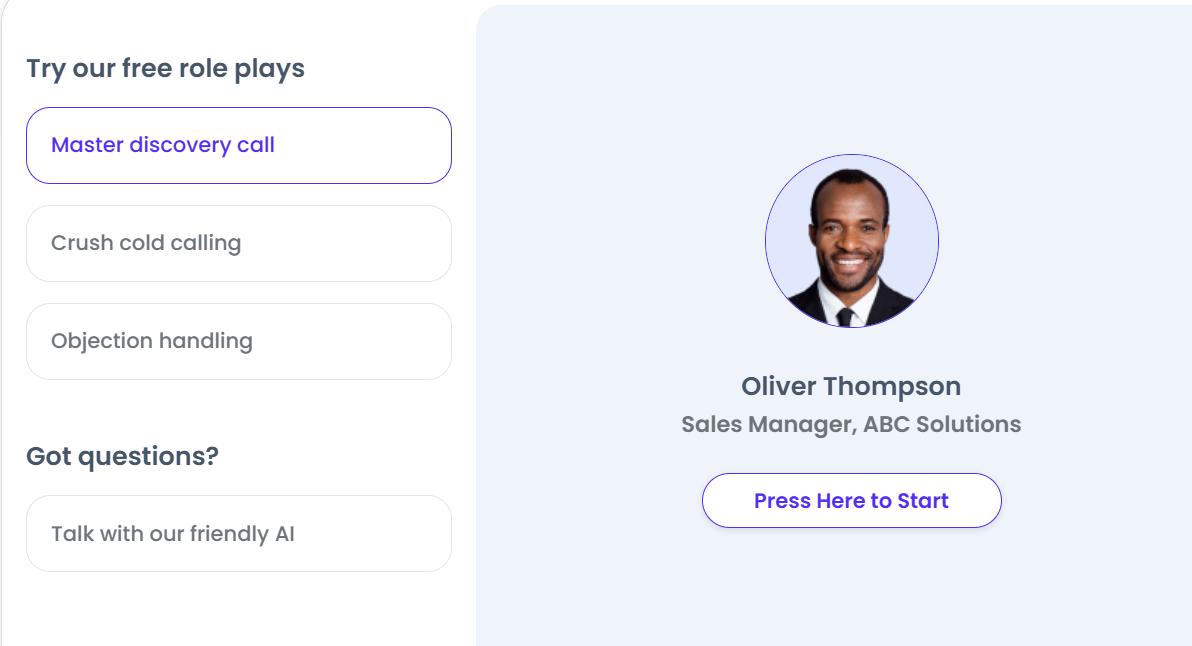
Key Features:
- Interactive AI Role-Plays: Reps engage in dynamic conversations with AI-driven characters, which simulate real customer interactions. This allows reps to practice pitches, discovery calls, or objection handling in a lifelike setting.
- Real-Time Personalized Feedback: After each interaction (or even during it), Second Nature provides instant feedback on things like a rep’s communication style, tone, and messaging. The feedback is often specific and actionable (e.g., pointing out if a rep didn’t ask enough open-ended questions).
- Customizable Training Programs: Managers can tailor training scenarios to focus on specific skills or products. The platform offers templates and the ability to create custom role-play scripts aligned with your sales playbook or common scenarios.
- Progress Tracking: Second Nature includes dashboards to track each rep’s progress, highlight skill gaps, and measure improvement over time. This makes it easier for enablement teams to see ROI from training and identify who might need extra coaching on certain topics.
Second Nature AI Pricing:
Second Nature AI uses a customized pricing model. Costs will depend on factors like the size of your team, the features and modules you need, and the scope of training (for example, how many different scenarios or customizations). You should reach out to Second Nature’s team to discuss your needs and get a tailored pricing plan.
Considering SecondNature but curious about other options? Check out our detailed list of SecondNature AI alternatives for a broader perspective.
4. Quantified AI
Quantified is an AI-driven communication and sales effectiveness platform. It uses AI to simulate sales conversations and also to analyze real conversations, with the goal of improving how reps communicate and sell. Quantified’s focus is on behavioral analytics – understanding not just what reps say, but how they say it, and how that affects sales outcomes.
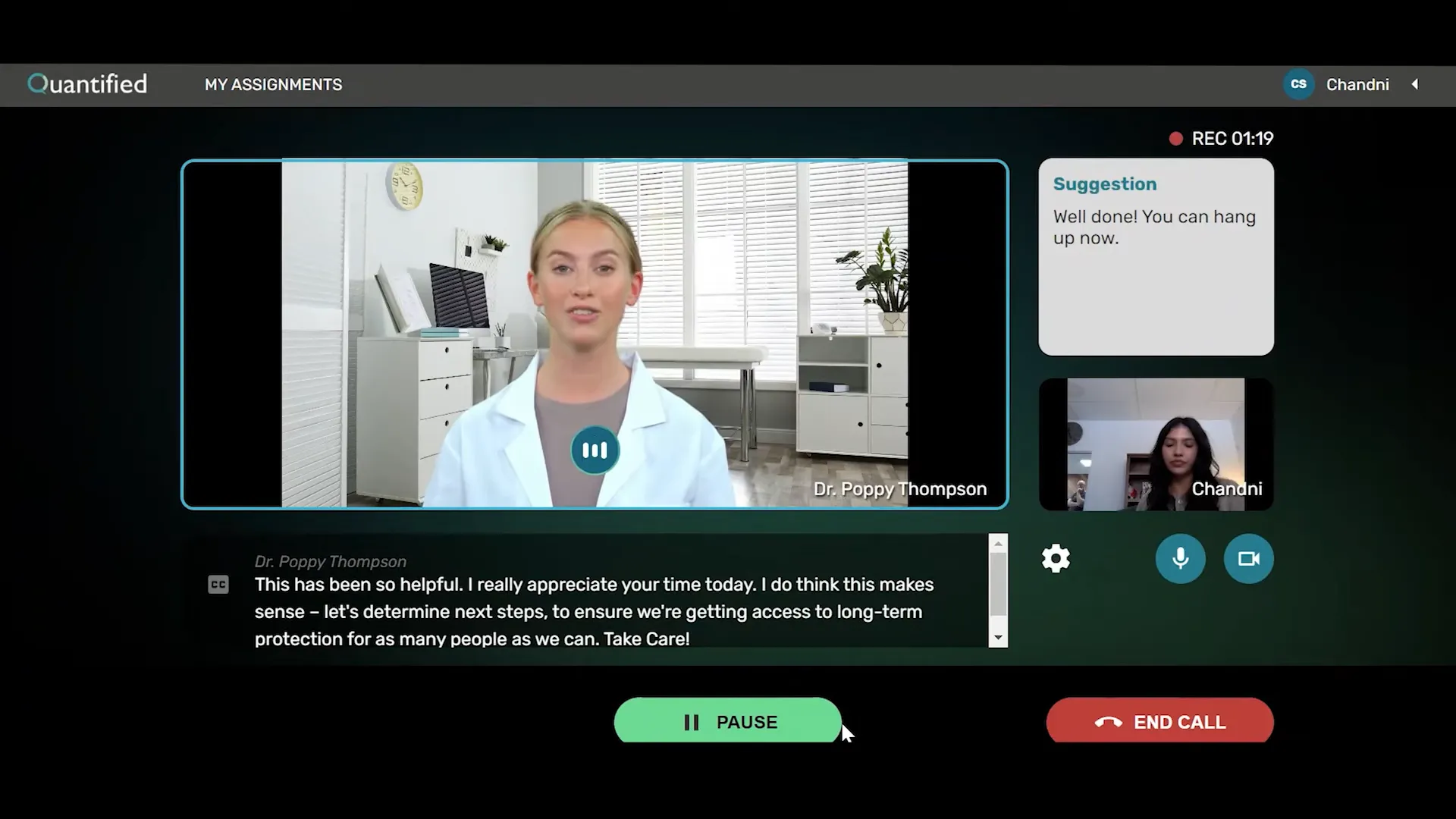
Key Features:
- AI Role-Play Simulations: Quantified offers scenario-based simulations where reps can practice sales calls with an AI counterpart. These simulations mimic real customer interactions, allowing reps to role-play scenarios like pitching, negotiation, or handling objections.
- Instant Coaching Feedback: After a practice session, reps receive immediate, personalized coaching insights. For example, the AI might point out if a rep spent too much time talking versus listening, or if they missed an opportunity to address a key customer pain point.
- Behavioral Analytics: One of Quantified’s strengths is its analytics dashboard, which breaks down communication behaviors. It can measure things like empathy, confidence, credibility, and clarity in a rep’s delivery. This helps pinpoint which soft skills need work.
- Certification and Development Programs: The platform supports scalable training programs which sales leaders can set up certification paths (e.g., a rep must pass certain simulated calls or achieve certain scores to be "certified" in a skill). This adds a level of gamification and ensures reps meet a benchmark before going out into the field.
Quantified Pricing:
Quantified’s pricing is also custom and tailored to the organization. The quote will depend on team size, which features you plan to use (simulation, analytics, etc.), and any specific deployment needs. Typically, you would contact Quantified.ai’s sales team for a consultation to get a pricing proposal aligned with your goals and budget.
If you’re evaluating Quantified and want more choices, explore our guide on Quantified AI alternatives to see how it stacks up against similar platforms.
5. Nooks AI
Nooks is an AI Sales Assistant platform with a suite of tools to automate and augment a sales rep’s daily workflow. It’s a bit broader in scope than pure role-play tools: Nooks offers an AI-powered dialer to increase call volume, an AI prospector for researching accounts and building lead lists, and an AI coach that can score calls and even engage reps in practice conversations. In essence, Nooks combines productivity tools with coaching features to help reps generate more pipeline while also improving their skills.

Key Features:
- AI Dialer: A power dialer that uses AI to optimize calling – connecting reps to more prospects in less time and potentially even calling at times or in sequences that lead to better connect rates.
- Real-Time Coaching: During live calls, Nooks can provide real-time cues or tips to reps (for example, nudging a rep if they are talking too fast or reminding them to mention a certain value point). It also enables managers to listen in or join calls for coaching on the fly.
- AI Role-Play Bots: For training and onboarding, Nooks offers AI-driven role-play scenarios. Reps can practice with virtual buyers or coaching bots to get up to speed on talk tracks and objection responses, which helps accelerate onboarding for new team members.
- Call Analytics: Nooks transcribes calls and provides analytics on call outcomes. Managers can review call recordings with AI-generated insights, seeing trends like common objections that are coming up or where in the call reps tend to falter. This informs what to coach on.
- AI Data Enrichment: Beyond calls, Nooks can also verify and enrich lead data (for instance, automatically updating CRM records or providing additional info on prospects). This ensures reps have quality information and can focus more on selling than data entry.
Nooks AI Pricing:
Nooks.ai does not publicly list pricing on their website. Given the range of features, they likely offer tiered or custom pricing based on which modules you need (dialer, coaching, etc.) and how large your team is. You would contact Nooks for a custom quote tailored to your sales team’s size and the specific features you’re interested in.
6. Replay
Replay (accessible at Replay.sale) provides an AI-powered sales training platform centered on conversational role-play simulations. The idea behind Replay is to shorten new hire onboarding and continuously improve close rates by letting reps practice real sales scenarios in a risk-free environment. Reps can jump into various simulated conversations with AI bots that act as prospects or customers, then get immediate feedback to help them improve.

Key Features:
- Conversational AI Role-Play: Sales reps can practice a variety of scenarios (cold calls, discovery calls, objection handling, etc.) with AI bots that converse naturally. This helps reps get comfortable with scenarios they’ll face with real prospects.
- Instant Feedback & Analytics: After each role-play, Replay provides instant feedback on the rep’s performance. This can include scores or ratings on criteria like how well the rep identified needs, built rapport, or handled objections, as well as qualitative tips for improvement.
- Custom Scorecards: Teams can customize what “good” looks like by creating their own scorecards. For example, if you have a specific sales methodology or key points reps must cover, the AI will evaluate the role-play based on those custom criteria.
- LMS Integration & Courses: Replay can integrate with your Learning Management System or be embedded into training courses. This way, role-play exercises become part of your formal training curriculum. The platform also supports white-labeling, so it can blend into your existing training workflow or portal.
- Scenario Customization: Enable highly targeted training by customizing scenarios to your products and common sales situations. Sales managers or enablement teams can script out particular situations (like a price negotiation conversation, or a specific competitor objection) for reps to practice repeatedly.
Replay Pricing:
Replay’s pricing details aren’t publicly available in detail. Typically, you’d sign up for a trial or contact their team for information. Since they emphasize booking a demo or getting started for free on their site, it’s likely they customize the pricing based on the number of users and any specific needs of your training program.
7. PitchMonster
PitchMonster is an AI-driven sales training platform built to help reps sharpen their pitches through quick, feedback-driven simulations, while actually making the process fun. The platform gamifies the training experience, encouraging reps to practice their sales pitches, product demos, and objection handling in a way that’s engaging rather than tedious. PitchMonster is particularly known for making simulated sales training approachable and even competitive for multi-generational sales teams.

Key Features:
- On-Demand AI Role-Plays: Reps can instantly jump into mock sales calls, product pitch presentations, or objection-handling exercises with an AI partner. They receive feedback within minutes, so they can iterate on their pitch quickly.
- Gamified Learning Environment: PitchMonster incorporates leaderboards, challenges, and badge rewards. This gamification drives adoption because reps often respond well to competition and recognition, turning practice into a friendly contest.
- Custom Coaching Criteria: Sales managers can upload their own sales playbooks, value propositions, and best-practice frameworks. The AI will then grade and coach reps based on those specific standards, ensuring training is aligned with your company’s messaging and criteria for success.
- Multi-Format Support: The platform supports multiple role-play formats – not just phone calls, but also video presentations or even email pitch simulations. This is great for reps who sell through various channels and need to refine skills beyond just phone conversations.
PitchMonster Pricing:
PitchMonster uses a custom pricing model. The cost will depend on your use case, number of seats (licenses), and any specific customizations or features you require. To get exact pricing, you’ll have to book a demo or contact their sales team. They will tailor the quote to fit your team’s size and training needs.
With all these robust tools available, how do you decide which one is the right fit for your team? It’s important to look beyond flashy features and consider how a platform will integrate into your workflow and actually drive better sales outcomes. Let’s discuss some key factors to weigh when choosing an AI sales coaching tool.
How to Choose the Right AI Sales Coaching Tool
When evaluating AI-powered sales coaching and role-play platforms, keep the following considerations in mind:
By weighing the above factors, you can narrow down which platform aligns best with your sales organization’s goals and constraints. Now, since Avarra AI has been our reference point, let’s do a quick side-by-side comparison between Avarra and one of its strong competitors, Outdoo, on some key capabilities.
Outdoo vs. Avarra: A Comparison Chart
To highlight how Outdoo (our platform, formerly MeetRecord) stacks up against Avarra, here’s a quick feature comparison across important capabilities:
As seen above, Outdoo emphasizes speed, customization, and integration, offering a very flexible and data-rich environment for sales practice. Avarra provides an immersive simulation experience but with a bit less flexibility in customization and integration. Both aim to improve sales readiness, but the approach and feature depth differ.
So… Which Tool Actually Fits Your Team Best?
Choosing the right AI sales coaching tool comes down to your specific workflows, priorities, and the level of analytics and customization you need. Avarra AI and the alternatives we discussed each have their own strengths. If we were to call out one platform that checks a lot of the boxes for modern sales teams, Outdoo AI certainly stands out. Here are a few notable reasons why Outdoo is making waves:
- Usability: Outdoo’s dashboard and workflow are designed for fast setup and ease of use. This means even busy sales reps (or enablement managers) can get up to speed quickly, lowering the learning curve regardless of experience level.
- Integrations: The platform connects natively to your CRM and communication tools. This tight integration allows coaching insights and role-play data to flow directly into your sales operations. For example, you might see practice scores or identified skill gaps alongside real pipeline metrics in your CRM, which gives a holistic view of rep performance.
- Realistic Scenarios: Outdoo supports scenario-based role-plays that mirror your actual buyer personas and pipeline challenges. Your reps aren’t practicing on generic prompts; they’re rehearsing the conversations they are likely to have in their current deals. This makes training moments highly relevant and impactful.
- Actionable Insights: With AI-powered scoring and analytics, managers can target their coaching where it will move the needle the most. You can track progress over time and even correlate improvements in readiness (like better role-play scores) with improvements in real sales results (like higher win rates), giving you confidence that the training is paying off.
- Scalability: Outdoo offers flexible pricing and onboarding options that can adapt to teams of any size, from a small startup sales team to a large enterprise force. As your team grows or your needs evolve, the platform can scale with you without missing a beat.
- Enablement Focus: The solution is centered on ramp-up speed, ongoing skill development, and rep readiness. Everything is geared toward aligning training outcomes with your revenue targets, whether that’s through faster onboarding (so new reps start selling sooner) or continuous development (so veterans keep improving their close rates).
- Built-in Coaching Expertise: Beyond technology, Outdoo provides structured coaching aids through features like role-play courses and "call blitz" practice sessions. These are curated experiences that incorporate sales best practices, helping companies ramp up reps faster by not only providing tools, but also content and frameworks for effective coaching.
For a quick hands-on look at how Outdoo works, here’s an interactive Outdoo walk-through guide that shows the platform step by step.
Ultimately, the ideal platform for you is the one that aligns best with your company’s ambitions and day-to-day reality. We hope this overview of Avarra AI and its top alternatives has given you clarity on what’s out there. Take into account the nature of your sales process, the gaps you’re trying to fill, and the experience you want for your reps and managers. With those factors in mind, you’ll be well on your way to making a confident, informed decision.
If you’re interested in exploring Outdoo AI further or have any questions, schedule a demo with us today. We’d love to help you find the perfect fit for your sales team!
Frequently Asked Questions
Avarra AI is a sales simulation platform with avatar-led role-plays and AI coaching to speed ramp and improve call performance.
Teams may want deeper customization, CRM-integrated insights, faster bot creation, or broader coaching/analytics options. This is where all-in-one revenue solutions like Outdoo AI can help.
Top alternatives for AI Sales Roleplay include Outdoo (formerly MeetRecord), Hyperbound, SecondNature, Quantified, Nooks, Replay, and PitchMonster.
Outdoo builds buyer bots in minutes, ties role-plays to live pipeline data, and offers structured scoring and CRM integrations.
Most vendors use custom pricing; contact their sales teams for a quote tailored to seats, features, and integrations.

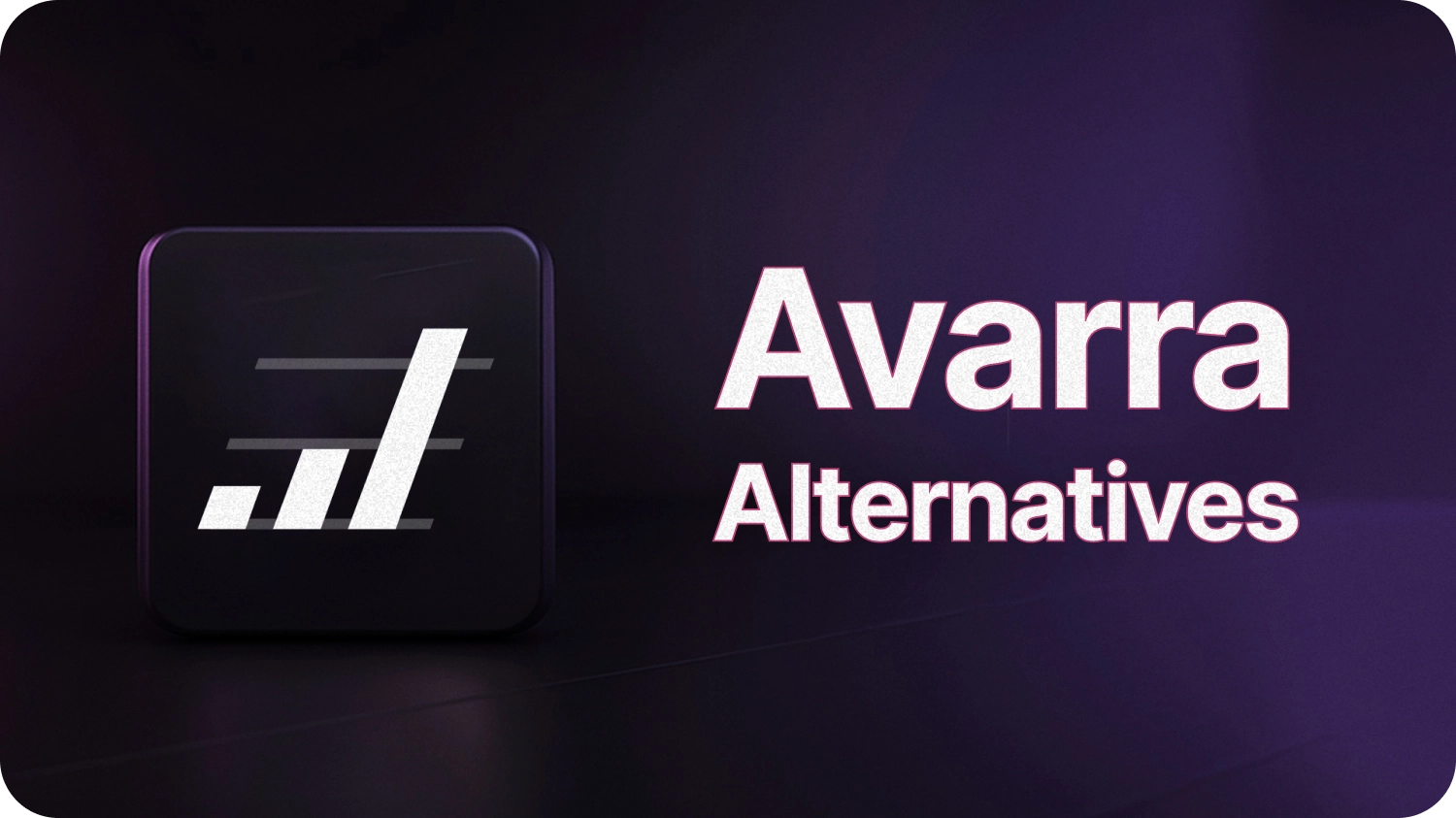
.svg)

.webp)








